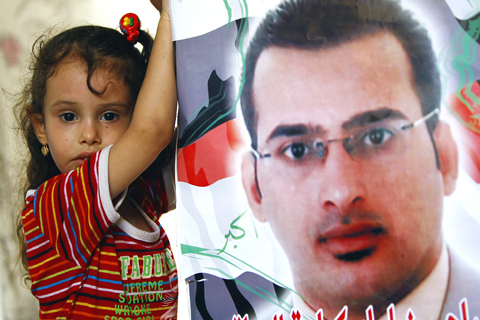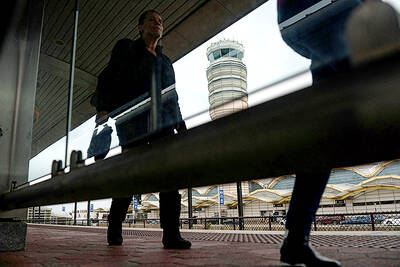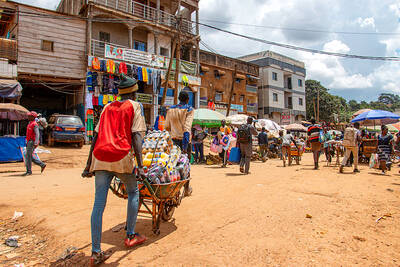As his size 10s spun through the air toward former US president George W. Bush, Muntazer al-Zaidi — the man the world now knows as the shoe-thrower — was bracing for a US bullet.
“He thought the secret service was going to shoot him,” says Zaidi’s younger brother, Maitham. “He expected that, and he was not afraid to die.”
Zaidi’s actions during the former US president’s swansong visit to Iraq last December have not stopped reverberating in the nine months since. Next Monday, when the journalist walks out of prison, his 10 raging seconds, which came to define his country’s last six miserable years, are set to take on a new life even more dramatic than the opening act.

PHOTO: AFP
Across Iraq and in every corner of the Arab world, Zaidi is being feted. The 20 words or so he spat at Bush — “This is your farewell kiss, you dog. This is for the widows and orphans of Iraq” — have been immortalized, and in many cases memorized. Pictures of the president ducking have been etched onto walls across Baghdad, made into T-shirts in Egypt and appeared in children’s games in Turkey.
Zaidi has won the adulation of millions, who believe his act of defiance did what their leaders had been too cowed to do. Iraq has been short of heroes since the dark days of dictator Saddam Hussein, and many civilians are bestowing greatness on the figure that finally took the fight to an overlord.
“He is a David and Goliath figure,” said Salah al-Janabi, a white goods salesman in downtown Baghdad. “When the history books are written, they will look back on this episode with great acclaim. Al-Zaidi’s shoes were his slingshot.”
From his prison cell, Zaidi has a sense of the gathering fuss, but not the full extent of the benefactors and patrons preparing for his release.
A new four-bedroom home has been built by his former boss. A new car — and the promise of many more — awaits. Pledges of harems, money and healthcare are pouring in to his employers, the al-Baghdadia television channel.
“One Iraqi who lived in Morocco called to offer to send his daughter to be Muntazer’s wife,” editor Abdul Hamid al-Saij said. “Another called from Saudi offering US$10 million for his shoes, and another called from Morocco offering a gold-saddled horse. After the event, we had callers from Palestine and many women asking to marry him, but we didn’t take their names. Many of their reactions were emotional. We will see what happens when he is freed.”
From the West Bank town of Nablus, Ahmed Jouda saw the incident on television news and felt so moved that he called together his relatives for a meeting in a nearby reception hall.
Jouda, 75, a farmer and head of a large extended family, convinced his relatives to contribute tens of thousands of dollars to support Zaidi’s legal case.
Jouda himself decided to sell half his herd of goats; another man asked if he might offer a young woman from his family as a bride. Jouda said he would ask if Zaidi was interested.
“I said we are willing to present him with a bride loaded with gold,” Jouda said. “We are people of our word. If he decided to marry one of our daughters we would respect what we said.
“We are compassionate and supportive to the Iraqi people for what they have gone through. We are people who have tasted the bitterness, sorrow and agony of occupation too. What he did, he did for all the Arabs, not just the Iraqis, because Bush was the reason behind the problems of all the Arab world.”
Zaidi’s brother insists that no one put Muntazer up to such an act. But he revealed that Muntazer had told him he had pre-scripted at least one line ahead of the fateful press conference.
From the roof of his brother’s new home, Maitham al-Zaidi said: “He always thought he would die as a martyr, either by al-Qaeda or the Americans. More than once he was kidnapped by insurgents. He was surprised that Bush’s guards didn’t shoot him on the spot.”
Muntazer al-Zaidi has told Maitham, and another brother, Vergam, that he is planning to open an orphanage when he leaves prison and will not work again as a journalist.
“He doesn’t want his work to be a circus,” Vergam said. “Every time he asked someone a difficult question they would have responded by asking whether he was going to throw his shoes at them.”
Muntazer has alleged that after his actions he was tortured by government officials. Medical reports say he has lost at least one tooth and has two broken ribs and a broken foot that have not healed properly.
“He will stay in Iraq, but first he has to leave the country to get his health fixed,” Vergam said.
In the run-up to his release, Maitham has a sense of the reception awaiting his brother.
He said: “I feel like Michael Jackson at the moment. Everywhere I go, people are taking pictures of me and asking for my photo. If they do that for me, what will they do for Muntazer himself?”

FRUSTRATIONS: One in seven youths in China and Indonesia are unemployed, and many in the region are stuck in low-productivity jobs, the World Bank said Young people across Asia are struggling to find good jobs, with many stuck in low-productivity work that the World Bank said could strain social stability as frustrations fuel a global wave of youth-led protests. The bank highlighted a persistent gap between younger and more experienced workers across several Asian economies in a regional economic update released yesterday, noting that one in seven young people in China and Indonesia are unemployed. The share of people now vulnerable to falling into poverty is now larger than the middle class in most countries, it said. “The employment rate is generally high, but the young struggle to

ENERGY SHIFT: A report by Ember suggests it is possible for the world to wean off polluting sources of power, such as coal and gas, even as demand for electricity surges Worldwide solar and wind power generation has outpaced electricity demand this year, and for the first time on record, renewable energies combined generated more power than coal, a new analysis said. Global solar generation grew by a record 31 percent in the first half of the year, while wind generation grew 7.7 percent, according to the report by the energy think tank Ember, which was released after midnight yesterday. Solar and wind generation combined grew by more than 400 terawatt hours, which was more than the increase in overall global demand during the same period, it said. The findings suggest it is

IN THE AIR: With no compromise on the budget in sight, more air traffic controllers are calling in sick, which has led to an estimated 13,000 flight delays, the FAA said Concerns over flight delays and missed paychecks due to the US government shutdown escalated on Wednesday, as senators rejected yet another bid to end the standoff. Democrats voted for a sixth time to block a Republican stopgap funding measure to reopen government departments, keeping much of the federal workforce home or working without pay. With the shutdown in its eighth day, lines at airports were expected to grow amid increased absenteeism among security and safety staff at some of the country’s busiest hubs. Air traffic controllers — seen as “essential” public servants — are kept at work during government shutdowns, but higher numbers

Elvis Nghobo tried to get into four different professional schools in Cameroon, but could not make it. Frustrated, the 34-year-old turned to selling food at a market in Yaounde, the country’s seat of power. Nghobo blames his woes on what he calls a corrupt education system that favors children of the elite. As the central African country prepares for Sunday’s presidential election, he said he would not be heading out to vote. He called the results a foregone conclusion for 92-year-old Paul Biya, the world’s oldest president, who has ruled for Nghobo’s entire life. “He is already too old to govern, and it’s boring